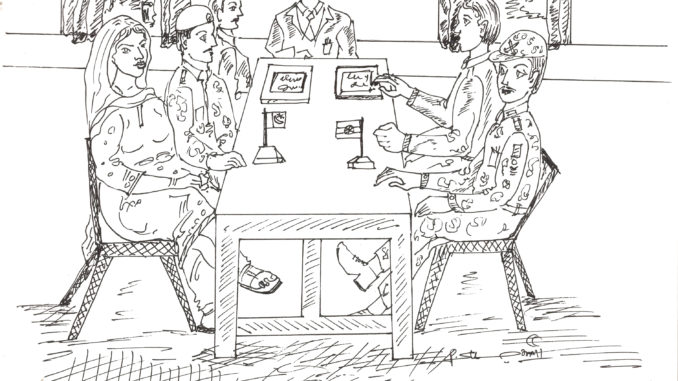
India 2049: Tyranny of Revenge
by
Shankar Ananth
Volume 1, Issue 1, Pg 34-39
Thank you for coming, Mr Ahmed. We were afraid you were going to run away,” smirked Joseph Francis, Hafeez’s older and much experienced Indian counterpart.
⊕
He clenched his fists. His lips immediately went dry, and his eyes shut, even without him knowing it.
Revenge is worth it.
⊕
A light appeared.
Hafeez Ahmed straightened his Prada tie as he gazed at the bathroom mirror.
A depleted, 31-year old man stared back at him. The long flight from Islamabad to Washington had not helped his appearance.
One of the most promising diplomats to come out of Pakistan was now facing the toughest task of his life. Among his many achievements in a short career were helping the US negotiate a peace treaty between Israel and Palestine, brokering the peace in Afghanistan, and achieving a rather difficult but favourable trade deal with China, that eventually saved his country from bankruptcy. But now, he was facing a hostile country, trying to fight for his nation not to get wiped off the face of the earth, and to bring sanity to the region that was stuck in an era of war, when the rest of the world had moved on a long time ago.
His forehead sweated profusely, despite the many splashes of water. The discussions were not going as planned, and Hafeez felt that he would break at any moment. He drew a breath of the artificial hotel air, wheeled around and walked out of the bathroom towards the conference hall. Armed soldiers watched over every corridor of the hotel. As he entered the room, he could see that Sheena Alam, Pakistan’s veteran foreign minister, keenly awaited his presence in order to continue. Everyone else was already in their seats, including the Chief of Army Staff. The tension was palpable.
“Thank you for coming, Mr Ahmed. We were afraid you were going to run away,” smirked Joseph Francis, Hafeez’s older and much experienced Indian counterpart. Hafeez could do little but offer a weak smile in response.
“So let’s continue from where we left off,” began Jeremy Richards, the US foreign secretary, mediating the discussion, as Mr Nayyar, the Indian defence minister, nodded in agreement.
“Yes, let’s,” Sheena Alam interrupted the conversation, seeking to take the advantage. “I believe we were discussing what you called a ‘pre-emptive measure’ to protect your country, and which you planned to blame on Pakistan.”
“Mrs Alam, if we are discussing this with you instead of taking action, you know we are serious about preventing any calamity. We could already have done lots without telling you.” The retort was authoritative and just stopped short of an intimidation.
“With all due respect Mr Nayyar, you can’t threaten us and force us to do something. We too want this madness to stop, but what you ask is simply impossible,” Hafeez chipped in, with determination, though knowing fully well where the power centre of this discussion lay.
“Alright, let me roll out the situation once again for your benefit,” Joseph Francis, the Indian foreign secretary, stepped in. “You have lost control of your nuclear weapons to elements that have openly been hostile to India: terrorists. From the secret ISPR conversation we intercepted last month, we know that though their loyalty to you is no more, but they do blame India for the famine in Pakistan--the famine for which your own government was responsible. Did I falter anywhere?”
“The Indus Water Treaty…,” Hafeez started.
“India never broke the Indus Water Treaty, and you know it!” thundered Joseph. “India just started using its fair share. Your government started diverting water to your mega-projects built by foreign inhabitants, without any concern for your people. Don’t blame us for your incompetence and lack of compassion towards your citizens. You have no right to do so.”
“We may have mismanaged water, but don’t teach us about compassion. You had more water than you needed. You could have helped us.”
“Well, I will again submit our demands to you,” Joseph said, ignoring Hafeez’s last comment. “We want you to hand over the control of your remaining nuclear devices to a trusted ally, so that they can be neutralized remotely. We also would like you to get assistance with your hunt for the ‘Coalition of Mujahid (CoM)’ militants who are in possession of the remaining nuclear warheads. Or we will be forced to take action.”
As an awkward silence gripped the room, the US foreign secretary spoke up, “With all due respect to the honorable guests from Pakistan, this seems like a reasonable request to me given the circumstances. In fact, it is also for your own good.”
“This essentially means an invasion of Pakistan, and we will never agree to that,” Sheena Alam said, with a conviction that sealed the matter.
Two hours later, Hafeez and Sheena, along with the CoAS (Chief of Army Staff), left the conference room, unsure and a bit shaken. It was 3:30 AM on a Tuesday. Thankfully, given the clandestine nature of the meeting, there were no media reporters thronging the venue. Hafeez and the CoAS followed Sheena into her room.
“Mrs Alam, what would we have done, had the situation been reversed?” Hafeez asked, a question that took the other two in the room by surprise.
Silence followed for an extended period before the CoAS responded, “What matters is what will we do now. Or rather, what will India do next. I suggest we alert our forces for now, get the Nasr ready. From what I can tell, India is hell bent on aggression and there is very little stopping them, except for our tactical nukes. Right now, as far as they are concerned, we have lost that leverage. They might be compelled to attack.”
“I agree,” Sheena said, much to the CoAS’ surprise.
He nodded.
“Please get your missiles ready. I do see the little skirmishes that’ve been going on turning into a bigger war, given India’s stance. But for goodness’ sake, I hope it does not become what we expect it to become. Frankly, I thought our nukes were safe!” her voice trailed away as she glanced at the CoAS, with a hint of indictment.
She received no words in response.
Fifteen more minutes of debriefing later, they decided to retire to their rooms for an hour and meet again in Sheena’s room at five in the morning.
Hafeez entered his room, a mere three doors down from the Pakistani foreign minister’s room. He switched on the lights, stripped to his underwear, and crashed on the bed. He forced his eyes open long enough to set the bedside alarm clock to an hour later, kiss the picture of his wife and daughter, and let himself drift away. He never knew when his eyes closed, for he was dreaming of seeing his family again. They were in a pool, his daughter splashing water all over him. The dream was perfect. It was everything he ever wanted.
But before he knew it, he was shaken awake by thunderous knocks on his door.
He wrapped the bed covers around him, and stood behind the door before opening it. Sheena and the CoAS entered the room, without any concern for his privacy, their faces dark with worry.
“Hafeez, we just received communication. It is code Red.”
For a moment, Hafeez forgot that he was almost naked in front of his boss. A code red meant it was a colossal disaster, and a stunning failure of diplomacy. The ground shook beneath him.
“But didn’t they say they’d wait till tomorrow morning for our…?”
“Well, they didn’t. Their side of the story is that their intelligence detected an attack position in Gilgit. And since we don’t have any control on them, we can’t confirm or deny that. I am leaving for Pakistan in 30 minutes,” said the CoAS, with more than a hint of worry on his aging face.
Hafeez turned towards Sheena for guidance, but she seemed just as lost for words as him. When she met his eyes, she opened her mouth, but words struggled to come out.
“We need to stay here. The need for diplomacy has never been more.”
Hafeez nodded in forced agreement. He used the brief moment to check his cell-phone. Three missed calls from Shabana, his wife. He did not respond.
The fact that India’s Army Chief had returned to India moments before the meeting began should have sounded alarm bells. Pakistan’s CoAS had decided to stay and attend the meeting, a fatal flaw. The hope that an aggressor could be prevented in such a delicate situation was a fallacy of the hopeful.
Hafeez excused himself to the bathroom, and came out looking much more presentable in a pair of shorts and a white tee. Sheena barely noticed the change.
“Sheena mohterma what exactly happened?” Hafeez initiated the conversation.
She didn’t look up. “Indian military has started bombing areas in Azad Kashmir. And things are very likely to spiral out of control.”
After a brief pause, she continued, this time looking at her subordinate, “As you know, after the CoM gained access to the nuclear warheads from Kori’s underground facility and Gadwal facility, we tightened our hold on the other nuclear assets. Though, from my sources I heard that a rogue ISI faction led to this catastrophe.
“I just had a conversation with Joseph. Since the CoM has these high-yield weapons, India says it is their right to target the areas in which they think these militants are holed up. And to add to that, they have tremendous backing from the international governments to act, with barely any caveats. We have to somehow find a way to get this madness to stop, at least from escalating into a full-fledged war…”
ΞΞΞΞΞΞΞΞΞΞΞΞΞΞΞΞΞΞΞΞ
Sponsored Link(s)
ΞΞΞΞΞΞΞΞΞΞΞΞΞΞΞΞΞΞΞΞ
“Contact the Chinese Embassy,” Sheena said the words, even though they weren’t needed.
Hafeez temporarily experienced a brain freeze. Twenty days ago, he was accompanying his foreign minister on an Indo-Pak cricket match, a sign of approaching normalcy. Now he was sitting bang in the middle of a probable nuclear war threatening to engulf the world.
Over the past few years, alliances had been formed, primarily out of compulsion. Chinese investments in Pakistan, to the tune of over a $100 billion, predominantly as a geostrategic investment under the façade of an economic initiative had resulted in some significant financial troubles for Pakistan. Some of Pakistan’s strategic assets had been transferred to Chinese ownership. India’s economic prowess meant a natural US interest, and a mutual attraction. Subsequently, NATO’s weight helped India form global bonds, whereas Pakistan was increasingly becoming a pariah, its only allies being China, North Korea, and Turkey.
Hafeez picked up the remote and switched on the television, going straight to the news channels. As he flipped through them, he saw news flashes all across, as the world tuned in to see the hottest nuclear flashpoint getting active. India had pulled away from Pakistan, both in terms of economy and military might, and except for the nuclear weapons, nothing much stood in the way of Pakistan’s eastern neighbour sweeping away its perennial rival.
He looked at Sheena. The next steps were clear, and very obvious.
“Contact the Chinese Embassy,” Sheena said the words, even though they weren’t needed.
A fifteen-minute call, and Hafeez realized how ill-prepared they had been. He turned to Sheena, in a state of shock. This had been planned all along. The Indians were already in touch with the Chinese, and had promised not to damage Chinese property, so as to not draw China into the war. The only safety net for Pakistan was torn apart. The simple fact was that Pakistan could not match India’s superiority in the air, land or sea. They needed someone to help them out. China had been their last hope.
Sheena’s phone rang. It was the CoAS. As soon as Sheena picked up, he got straight to the point. “The area of conflict is currently contained to Azad Kashmir, where the Indians have been conducting air sorties. We have been responding to them in kind, and so far have shot down one of their Rafale-Super 3s. But we have lost 4 JF-20s. There has been no ground conflict so far, and we are trying to keep it as limited as possible. We have also been in touch with the CoM to not take any foolish measures with their nukes.”
“Ok. But…”
“Here is what I would like you to do,” the CoAS cut in, before Sheena could make her point. “Contact the Chinese. Ask for assistance. Also, see if Turkey can help us with some funds.”
“China is not going to interfere. The Indians have already made sure of that,” replied Sheena, which was followed by silence at the other end. “I will contact Turkey for any assistance they can provide.”
“Ok. Keep me posted,” the CoAS seemed unperturbed by the news, characteristic of any man in that position.
Sheena turned to Hafeez and conveyed the message. Rushed communication was shared with Pakistan’s possible and probable allies across the world.
Hafeez spoke to his Indian counterpart, Joseph Francis, and immediately arranged for a meeting in the conference room. Within twenty minutes, the Indian and Pakistani envoys, along with the American mediators, found themselves in a heated discussion on the situation.
“This is selective bombing. You can’t ask my country to not defend itself from aggressors,” droned Joseph.
“We are in a state of war. The air forces of both our nations are involved in a bloody battle over one of the most disturbed areas in the world. We both have allies, some much closer than the others. No one wants this to turn into a world war, right?” Sheena Alam countered her Indian counterpart, defiantly, but secretly she knew words were her only major ally right now.
“Ms Alam, we know whom you are referring to. If you think that is going to be a threat to us, I am sorry to disappoint you. The only solution here remains that you assist in neutralizing the targets. The fact of the matter is that India can afford to fight on its own. You can’t. I am helping you make a decision that ends well for everyone.”
“To all the Indian envoys, with my due respect, tread very carefully. Mutually assured destruction is not merely a theoretical concept, but a very real thing.”
⊕
Gilgit
That day
12:30 AM
Col. Danish Khan sat up in his bunker, thinking. His role in helping the CoM secure the nuclear weapons was now known to most of his compatriots. Part of the ISI hated him for the act, and for plunging his ailing country into war. But he took strength from the fact that a significant section of the tribal jihadis, whom he had supported all the while, were in his favour.
He had set up a command centre at a location conspicuous by its very presence: bang in the middle of a little village at the edge of the Gilgit city. And no one would give him up.
Now that he had defied all common sense to achieve glorious vengeance, he slowly became cognizant of the conditions, and the actual disparity of military strength between the two nuclear armed neighbours. The biggest setback was that his trump card had not played out the way he thought it would. The Chinese had not interfered at all, in a huge surprise to Danish. He looked at his satellite phone. No instructions so far. Outside, the bombs were raining furiously, shaking the ground beneath him. Was he left to fend for himself?
Thirty minutes later, the phone rang. He was glad to hear the voice at the other end. After a brief call, he shook his head to force himself to believe what he was about to do. He called Abu Kamal inside. Despite his initial hesitation, he knew it was the only thing that would give them a chance.
“Bomb the Khyber land route. That is 20 kms away from the current bombing site, isn’t it?”
He could sense the surprise grow in Abu Kamal’s eyes as he delivered his instructions.
“Are…are you sure?”
“Yes. Clear the entire area of people, and raze it to the ground. Nothing is to remain standing.”
Still confused, Abu Kamal left the room, but defiant in carrying out the assignment handed to him like he had done for the last four years since he took over the operations of the CoM.
Danish Khan sincerely hoped this would work. If not, doomsday was certain.
⊕
Washington
The Four Seasons Hotel Lobby
7 PM
Joseph Francis sat with his minister, Shyam Nayyar. In their hands were glasses of the Remy Martin cognac. Their minds were desperately trying to relax with the help of alcohol after a day of frenzied discussions, planning, and counter-planning. Though the discussion began on the quality of cognac in India, it somehow kept circling back to the war despite their deliberate attempts to think of anything but.
So far, things were moving in their favour, and a couple of swift moves had taken Pakistan by surprise. The glasses of cognac were part of undeclared celebrations.
A ping to his mobile almost made Joseph spill his drink. He looked up at his boss.
“China has attacked India.”
“WHAT??? Did we hit them?”
“No. I hope not.”
A rushed call from India gave them the AS-IS situation. Chinese troops had come in to guard their property. India-made shells were found near the site of destruction that had given China a reason for escalation, despite India’s careful attempts at swerving the scene of battle away from any Chinese installations. It was a quagmire. A single bad move could trigger a wave of destruction much greater than anything before. Within a space of 12 hours, the war had gone from dormant to a continental clash of superpowers.
⊕
Washington
Room 801, The Four Seasons Hotel
10 PM
With his phone firmly in his hand, Hafeez flipped through the news channels for any updates. He was waiting in his boss’ room, and they were both anxious. News of China’s interference in the war bought a smile to their faces.
Hafeez’s plan had worked. His instructions to Col. Danish had paid dividends. Now the Indian forces will back off, and with Chinese help, Pakistan will annex swathes of their territory.
Their rightful territory!
The few moments of elation transformed into radical shock as they saw the Indian forces invade Pakistan. Things were rapidly getting out of hand.
About two decades ago, till 2029, India relied on the ‘Prahaar’ doctrine of attack, an enhancement of India’s ‘Cold Start’ doctrine from the start of the century. But Hafeez was told that now India’s position had become much bolder. This new doctrine combined an Indian aerial blitzkrieg with an assisted covert attacks on Pakistani cities. Drone attacks were launched into Pakistani cities of Rawalpindi and Islamabad, an attempt to cripple both the administrative and military control centers.
Hafeez panicked. He had never expected this. As soon as he heard the news about the attacks on Islamabad, he tried ringing his family. His wife picked up.
“Hello darling. Are you…”
⊕
ΞΞΞΞΞΞΞΞΞΞΞΞΞΞΞΞΞΞΞΞ
Sponsored Link(s)
ΞΞΞΞΞΞΞΞΞΞΞΞΞΞΞΞΞΞΞΞ
The voice trailed away as the light faded. It echoed mildly at first, but then started getting louder.
“Sir, I am switching off the simulation. Your scores have fallen below the cut-offs.”
A blinding light entered Hafeez’s eyes as he felt a small chip exit his brain socket. He struggled for what seemed like eternity, and eventually dared to open his eyes wider. The room seemed like a polished laboratory he remembered from his childhood comics. Slowly, his memory made a comeback as well.
“Mmm…what did I do wrong?” he asked, as he took notice of the number of doctor-like figures in the room. Some looked South Asian, while the majority were definitely Chinese.
“Sir, do you remember where you are? I want to check your memory first. Please tell me the names of your wife and daughter,” questioned the doctor, handling him rather politely.
“Mmm..Shabana and Fatima.” Hafeez barely had to struggle to remember their names. How could he ever forget?
“Sir, this was the simulation of the war in 2049, and you have repeated the same mistakes again. You made some poor calls and let your feelings cloud over your judgement while taking decisions. You took an unnecessary risk and led your previous country down the path of destruction. The move to setup India by destroying Chinese property was a colossal waste of resources.
“It is now 2069, and war strategies have advanced a lot more. Sorry to say, but this was your last attempt at becoming a war strategist for the Chinese-Pakistani army. You will no longer be taking part in the rest of the recruitment process. The drive for revenge isn’t simply there.”
A teardrop appeared on Hafeez’s face, but he fought any attempts to let it run down his face. As he exited the simulation room and left the strategy office of the SinoPak Corporation for one last time, he tried to make himself feel better by recalling his age. He handed over his identity card, and the moment it got deactivated with a loud beep, he felt a dream getting crushed.
Outside, he put on his body-mask as he waited for the metro-tube to arrive. The radiation levels in Islamabad were still significantly high to roam around freely. As soon as he got into the metro-tube, he found himself an empty seat and carefully removed his body-mask, which he then folded and put in his backpack. These things were expensive, and it will be a bloody shame if it got stolen.
He gazed out the window, at what was once a sprawling city. Now, he saw a red hue outside, with the kind of vegetation he had never seen for the first thirty-one years of his life. The fact that people avoided going outdoors helped in the unbridled spread of vegetation.
Hafeez closed his eyes, for the sight outside was not worth seeing. ‘Was it all worth it?’ was the question he had been asked by his leaders to avoid. “This is not a good time to think about that,” they had said. And he agreed. Revenge was important.
Twenty years ago, the inevitable had finally happened. The threat of rogue state actors and a prolonged water crisis in Pakistan had led to a cascading, devastating war that had resulted in the death of over 30 million people, mostly in India, Pakistan, and China. His recollection of the details in the simulation was surprisingly vivid and accurate.
He had been teaching a class when Islamabad’s central district was obliterated, where his wife and daughter had been. The shockwave of the blast and the physical trauma it caused had been ineffable. But the pain of not being able to find out what happened to his family, yet knowing what transpired, was million times greater.
Pakistan had been reduced to a pile of buildings littered with corpses over what was once a mammoth nation of 200 million people. India had suffered losses as well, but Pakistan’s core identity was physically destroyed. Pakistan had lost its identity as a sovereign state, and was left with no other option, but to be absorbed by China.
The remaining Pakistani society had made it their aim to exact revenge. India had to be destroyed. The Chinese were only glad to help them on their way.
Hafeez entered his house, which was essentially a concrete structure surviving on its last legs. He had been trying to look for a new resting place, but nice spaces were hard to come by in this regulated economy full of scramblers for basic necessities.
Having poured himself some cereal, he sat down on the rickety couch, carefully avoiding the protruding springs, he glanced upon the dusty picture of his wife and daughter. He had to wipe off the ash, even though he had done so only this morning. He picked up the picture, and kissed both of them.
He would never be able to fight again. But then, he thought, fight for what? Was anything worth losing this much? Was revenge worth losing so much? Was any revenge worth it at all?
He switched on the television where the state propaganda TV yelled on about national pride and revenge, and the glory of martyrdom. Glancing at the ash-covered picture of his family, he shook his head in shame.
“Was it all worth it?”
He was sure of the answer to the stupid question.
⊕
Shankar Ananth works for McKinsey & Company as a digital consultant. He is an Aeronautical Engineer from Punjab Engineering College, Chandigarh and has an MBA from MDI, Gurgaon. He loves writing, with a slight tilt toward sci-fi. You can talk to him about mangas, anime, football, cricket, geopolitics, economy and technology – basically everything under the sun!
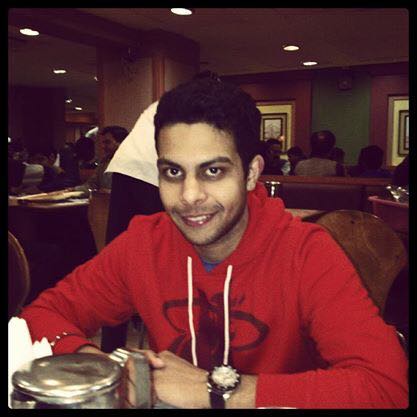


ΞΞΞΞΞΞΞΞΞΞΞΞΞΞΞΞΞΞΞΞ
Sponsored Link(s)
ΞΞΞΞΞΞΞΞΞΞΞΞΞΞΞΞΞΞΞΞ

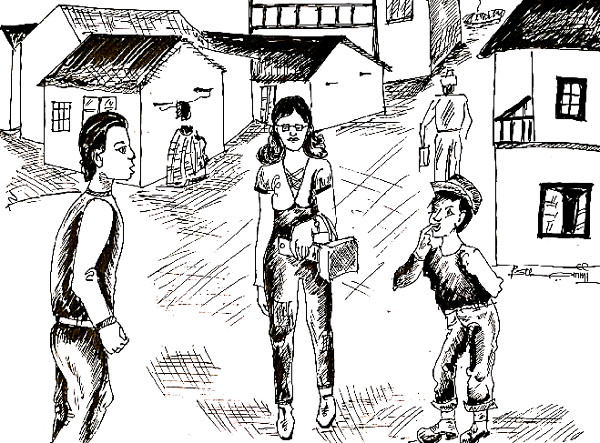
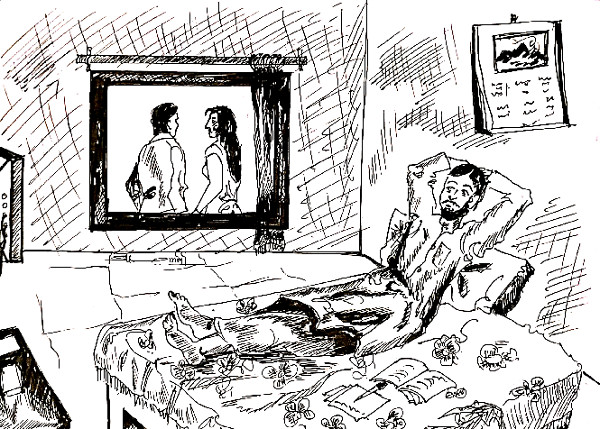


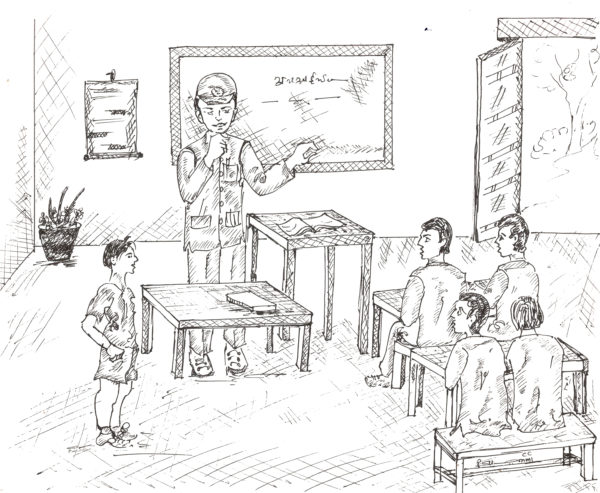
Leave a Reply